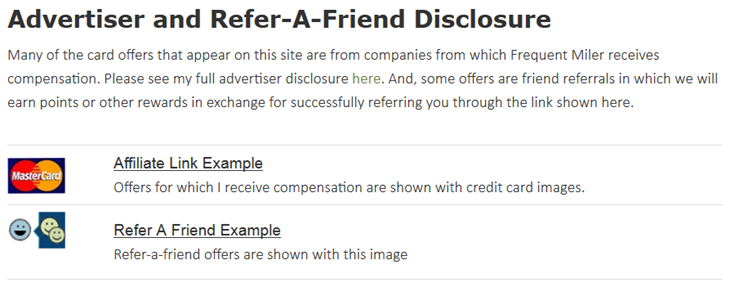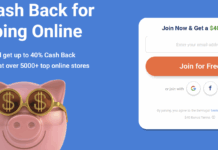NOTICE: This post references card features that have changed, expired, or are not currently available
I started this blog in September 2011 as a hobby. I was terrifically excited about the travel hacking “game” and I wanted to share it with friends and family. A couple of months later, I learned about credit card affiliate links. I didn’t know it at the time, but my application to join an affiliate network was my first step towards turning my hobby into a career.
Affiliate links work like this: through an affiliate network (middle-man) a blogger or other internet publisher gets unique links to products and merchants. The blogger publishes those links. Then, when a reader clicks through one of those links and buys something, the blogger gets paid. It works exactly like online shopping portals except that the blogger earns rewards instead of the consumer.
At its best, affiliate marketing is a way for blog publishers to earn money for writing about the exact same things they would write about anyway. At its worst, affiliate marketing turns bloggers into the digital equivalent of used car salesmen.
Merchandise affiliate links
With many affiliate links, there’s a conflict of interest between what is best for the blogger and what is best for the consumer. When a consumer wants to buy something, they can click through a portal to earn rewards for themselves, or they can click through a blog affiliate link to earn rewards for the blogger. They can’t do both. And, while it is in the consumer’s best interest to find the lowest prices, the blogger usually earns more money when the consumer spends more.
Credit card affiliate links
With credit card affiliate links, the interests of the consumer and blogger are sometimes aligned. Since credit cards aren’t available through portals, there is usually no downside for a customer to use an affiliate link when signing up for a credit card. Big signup bonuses are great for the consumer (as long as they’re responsible with their credit, of course) and great for the blogger since those big offers drive lots of sales (behind the scenes, credit card signups are referred to as “sales”).
Often, though, the interests of the consumer and blogger are not aligned. Here are a few examples:
- Differential payouts (or none at all): Credit card affiliate payouts range from tens of dollars to hundreds of dollars per successful sign up. However, many credit cards aren’t available through affiliate channels. So, clearly, bloggers are incentivized to recommend certain cards over others.
- Affiliate promotions: Now and then bloggers are offered extra pay if they sell more cards. Usually the offer is tied to a particular card and the blogger receives extra commission if they sell more than X number of cards during the promotional period (typically a month or so). Again, this incentivizes bloggers to recommend those cards above others. Did you ever wonder why some blogs suddenly started writing a lot about certain cards that they had previously ignored? If you see this happen for the same card across multiple blogs, chances are that a promotion is in effect.
- Best offers vs. affiliate offers: Sometimes the credit card offers available through affiliate channels are not the best publicly available offers. For example, at the time of this writing, the best public offer for the Citi Premier card is 50,000 points (found here), whereas the best affiliate offer is 40,000 points. Similarly, 50,000 point offers for Chase Southwest cards are almost always available if you know where to look (on my Best Offers Page, of course), but the affiliate offers tend to cycle up and down between 25K and 50K. In these situations, bloggers are incentivized to publish offers that are not in the reader’s best interest.
My approach to affiliate links
Revenue from affiliate links and ads make it possible for me to blog full time (see: My job? I blog. Here’s the answer to your next question…). My goal, though, is to publish what’s best for my readers rather than for myself whenever the two are not aligned. For example, with credit card affiliate links, we observe the following rules:
Be transparent: Affiliate rules do not allow me to display the commission earned with each credit card, but I can try to make it clear which links are affiliate links and which are not. Towards that end, we show credit card icons next to affiliate links, but not next to others. And, we clearly disclose this on each credit card page, like this:

Best Offer means best offer: If we are aware of a publicly available credit card offer that is available online, we always link to that offer rather than an inferior affiliate offer (See the current Citi Premier link, for example). If we are aware of a better offer that is semi-targeted or only available in-branch, we list that information along with the publicly available offer. For example, at the time of this writing, if you look at the Chase Ink Plus offer on our Best Offers page, you’ll see a note saying “Sign up in-branch to get the first year annual fee waived.”
Recommend cards based on value to the reader, not to me: All credit card offers are managed from a spreadsheet. Within that spreadsheet, we calculate the estimated first year value of each offer. You can think of this as the estimated value of the signup bonus, less the first year annual fee. On our Best Offers page, offers are separated out by bank and often by type (e.g. airline cards, hotel cards, cash back cards, etc.). Within each of those groupings, cards are sorted in descending order by the estimated value of their signup bonus. In other words, cards that pay me more do not get more attention. You can learn more about this approach in these posts and pages:
- Credit card signup bonus estimation details
- Top 10+ Transferable Points Program Credit Card Offers
- Top 10+ Airline Credit Card Offers
- Top 10+ Hotel Credit Card Offers
Never include credit card affiliate links within daily blog posts: In my mind there’s a difference between blog posts and blog pages. Posts are the articles we write daily containing analysis, stories, deals, etc. Pages are the things found in menus on this blog. They are mostly informational resources: best offers, how-tos, complete guides, etc. Often posts become pages when we find that they’re worth a permanent place on the blog. While some pages have credit card affiliate links (along with many disclaimers about the affiliate relationships), posts never do (unless they later become pages).
There are a few reasons for this rule. The most important is that it helps me to separate the creative act of blog writing from the business of the blog. The rule helps me keep my focus on the story I want to tell rather than the possibility of money to be earned. Another reason for the rule is that I think it helps with the appearance of impartiality. I work hard to keep reader’s interests in mind, but it might not look that way if I were to interrupt my posts with credit card affiliate links.
I may revisit this particular rule at some point in the future if it seems like readers would be better served having the links within posts, but for now at least I have no plans to change this rule.
Referral links
Referral links are similar to affiliate links. Mostly, they work like this: you sign up for something: a portal, a product, a membership, etc. And, the company behind that thing offers you an incentive to encourage your friends to sign up too. A simple example is the cash back portal BeFrugal. BeFrugal currently offers you $10 when a friend signs up with your referral link and makes a purchase through the portal (your friend also earns $10, by the way).
I used to treat referral links the same as affiliate links: I kept them on a separate page (found here) and never listed them within blog posts. Recently, though, I decided to change that policy. Here’s why:
It’s less annoying: My previous rule was annoying to some readers. With the previous rule, when I wrote about a deal that involved an opportunity for a referral bonus, I linked to my referral links page rather than the offer itself. If readers wanted to help me out, it required more effort than necessary: they had to click through to the referral link page and find the particular link of interest. With the new rule, the relevant link will be in the post and easy to find.
It makes better business sense: This blog is my career, so it makes sense to earn money where I can. Due to the old rules, I used to link directly to some deals without referral links. Now, as long as my link gives the reader the best available deal, I’ll use a referral link.
Less conflict of interest than credit cards: Most referral bonuses are worth $5 or $10. Some are worth as much as $20, but it’s rare to see any bigger than that. So, the stakes are relatively small. Plus, its rare to see a referral link that is not the best offer for the person signing up (but it does happen occasionally, so we’ll let you know when we’re aware of it!). And, unlike affiliate commissions, referral commissions can be fully disclosed. If I know I’ll get $20 when you sign up for something, I’ll let you know.
Less maintenance, and automatic disclosures: I’ve moved all of my referral links into a data table. By doing so, I can maintain information in one place even while displaying it in many posts. For example, here’s my current table entry for BeFrugal:
| Name / Link | Offer | Frequent Miler Notes: |
|---|---|---|
| BeFrugal | You will earn a $10 bonus after earning at least $10 back through purchases. We'll earn $10 too. | In our experience, BeFrugal is a reliable cash back portal. |
As you can see above, the table information includes the referral link, information about what you will gain, information about what I will gain, and Frequent Miler notes (often a mini-review of the service). As things change, I can edit the table info in one place, and all posts showing my BeFrugal links will be automatically updated.
Non-credit card affiliate links
In addition to credit card affiliate links, I have access to product and merchant affiliate links. I keep these in the same table as my referral links. I’ll display these links (with disclosure) only when I’m not aware of any better options for the reader. For example, in posts about 1800Flowers, I haven’t displayed my affiliate links because there are always good portal options for that merchant that will benefit the reader. With posts about Amazon.com, though, I may post an affiliate link if the circumstances warrant it. The reason? Even though Amazon.com is available through many portals, there are almost always strict limits on which product categories apply. Most products bought through Amazon.com do not qualify for portal rewards, but they do earn affiliate commissions.
Wrap Up
My credit card affiliate link policy hasn’t changed. Credit card affiliate links are still shown only on a select few fixed blog pages and only when they match the best publicly available offer. Referral links and non-credit card affiliate links, though, will be shown within posts, but only when I’m not aware of any better deal for the reader. And, I’ll always disclose not just the benefits to you, but to me as well.
Your thoughts? Please comment below.





Greg your blog rocks! My wife and I have used your links quite a bit. I was wondering if they show which individuals are approved or is that part of a confidential protocol?
Thanks Nick. With credit cards: no, I can’t see anything about who applied. With referral links (like referrals to a cash back portal, for example), it depends. Many do show the email address, at least, of the person who signed up.
Transparency rocks thanks! One question, are airline-direct mileage sales also affiliate links?
I’ve heard that some bloggers have affiliate links for those, but I haven’t looked into how that works. I should look into that…
Appreciate your transparency. Taking a break from churning for a few months, but will be clicking your links as a thank you for your work.
I love your links and find them to present the best offers time and time again. You are great at updating them and have the most manageable listing of credit card offerings (I mean I can go easily to the offers I am interested in). This transparency is A+. Great great job and service. And I note that I am not into manufacturing spend or looking for best sync specials so many of your articles are not of interest to me. But love your credit card links. From a seasoned miles and points person.
You don’t seem as bad as most of the used car salesmen types on Boarding Area. But this blog has been slipping for a while. Too bad. It used to be one of the best.
John you make a valid critical comment. But the big problem is the death of MS has occurred with the new wave of Fed tightening………they are cutting the fluff and they believe they can do it and not hurt the economy…..we shall see………..but the question it begs is if you were doing MS every month and deflating your credit score as a result then why would you continue to do that when signups are so much easier and so much more stress free……….that is the death knoll for Boarding Area and it must adapt and must adapt quickly if it is to have hope of survival at the “same” levels……………
Cant wait until you try to kill the next deal. Awesome, get the pumping up and going. This hobby is dying you gotta try to stay alive for as long as possible.
Thank you for your integrity, Greg. You avoid the temptation of shamelessly promoting (often inferior) CC affiliate links, and I’m happy to avoid the temptation of clicking those mindless promotions. You and one other source (of equal integrity) have been getting all my CC apps. You deserve it. Keep up the good work.
Greedy bloggers probably think you’re a douche – (no offense to douche – its a fine product.) The article was great – and my guess is that it will bring a ton more business – which is what great ethics in business ought to do. Keep up the good work.
I’m going to Greece this summer – thanks to your help (among a few other good guys and gals.) Thanks!
No worries, do whatever you want. We trust you.
That said, I’ve been subscribing to your newsletter since April 2015. Is there any possible way I can reduce the amount of emails? Since they tend to be quite long and detailed, there’s just no way I can keep up with you.
I am already 15 or so newsletters behind (I try to read each an every one). But my busy life prevents me from doing so.
I could not find an option to change delivery to, say , weekly, or to only subscribe to a weekly re-cap of all newsletters for that preceding week.
Ethical capitalism! What a concept!
Since there’s such a barrage of nice comments, I thought I’d leave one also. I do appreciate your blog and religiously check it daily. I have been doing this for at least 2 years and will continue to read on.
I feel the same as Howard and the others expressed. Thank you.
I get a lot of value from your blog and am happy that you also receive compensation while helping me obtain this value.
You’re the best, Greg! My family’s apps are always thru your links.
just keep doing what you’ve been doing and no one will care if the signup offer is a referral. most of your readers know when a blogger is simply pimping a CC (since they all do it within 24 hours of each other for the same card).